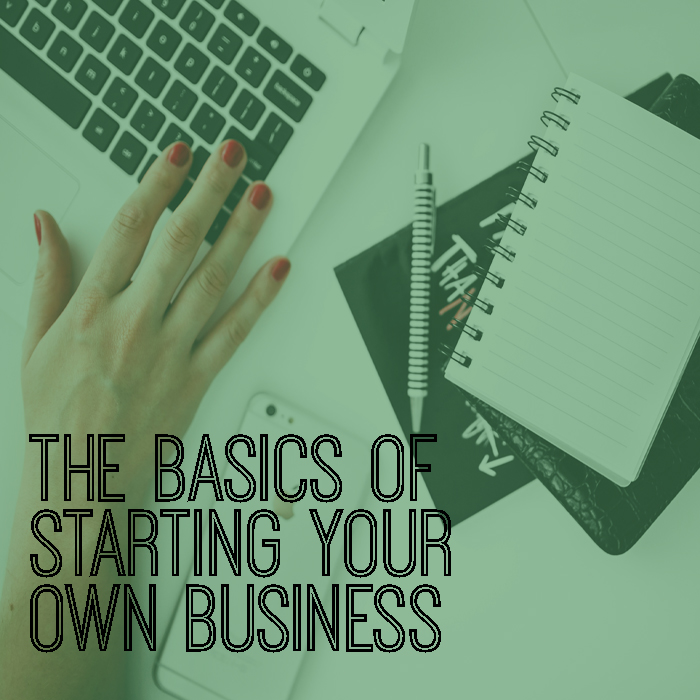The basics of starting your own business
By Jes Egan
Thinking about starting your own creative business? Or have you already and are not sure that you’ve set everything up correctly? I’ve had many conversations with people who are toying with this idea and wondering where to start. I don’t mean what your business does or what it will sell, as generally the people I speak to already have that part sorted out. Most people know what they want to do, just not necessarily how to go about it or where to start. Personally, I think if you have your creative business idea worked out and you think there is a market out there for you, then that is the hardest part.
Some of the most amazingly creative people I’ve found are often overwhelmed (or bored) by what I’d call the ‘admin’ side of setting up a creative business. It can be the not-so-exciting part of your business, but it is really important. Taking some time and putting in the effort into this may seem fiddly and annoying but doing it properly can save you time, effort and money in the future.
What’s in a name?
The name you trade under is so important. How you come up with a name or what you choose can all be the fun part, however there are some requirements that you will need to check before you start using it.
If you wish to work under your own given name as a sole trader then you don’t need to register ‘your’ name, however if you wish to trade under a business name, you will need to register this name with ASIC (Australian Securities and Investments Commission). First thing to do is check that the name you wish to use is available and not being used by someone else. You can do this here. If the name you wish to use is available you then need to register this name with ASIC, you can do this here.
Just note that you will need to have an ABN (Australian Business Number) or be in the process of applying for one (with an application number) to do this.
An ABN (Australian Business Number) is important to have, although it isn’t mandatory if you’re a sole trader (as you will use your Tax File Number). To find out if you’re eligible for an ABN have a look here.
Money, money, money
A business bank account is one of the things I can’t recommend enough. It is really important to keep your business and personal accounts separate. This is a good way to keep track of what money is business related and to ensure you don’t spend too much of your personal money on business expenses.
I would recommend shopping around for the best business account for you - fees can vary so ensure you find something that you’re comfortable with, keeping in mind that you will need your ABN available when opening business bank accounts.
For my little creative business I have three accounts;
-
A transaction account, where the income from my sales goes and my expenses goes out of
-
A GST account, this is where I put 10% of all of my income into to ensure that I have my GST available if I’ve earn't enough that financial year to pay it
-
A business savings account, if I have a little profit sitting in my transaction account I move it into this account to earn better interest
Often banks can help with a small start-up loan or overdraft, which could be something worth considering as unexpected costs can happen. A Small Business Banker likes to see your business plan and don’t panic if you’re not sure it’s complete, some banks are happy to see a work in progress and some of them will even help you with this.
Registering for GST is something to think about if you run a creative business in Australia. If you’re expecting to earn less than $75,000 per financial year, then technically you don’t have to register, but if you think you may get close to that amount then you may need to. You can register for GST when you start your creative business or any time after if you think you’re going to reach the $75,000. If you would like more information about registering for GST have a look here.
Quoting and invoicing is also something that is important to know how to do. I’ve written a specific post dedicated to this alone, see the Guide to Quoting and Invoicing.
Call in the experts
When running a creative business you won’t be able to (or want to) do everything. Knowing when to bring in an expert in to get the right advice is an important thing to understand. For me, this is with all tax related items as this can be daunting at the best of times. I strongly recommend getting a qualified accountant’s advice for tax related issues.
If you can afford it, there are business mentors that you can work with that can help risk assess your product, target audience and business plan. A good place to look for one is through the Small Business Mentoring Programs (SMBP).
There are many things to set up for a new creative business and these are just some of the things that will help get you on your way. Taking the risk and going out on your own is a big step but don’t be scared by the ‘admin’ things. Once these are done, you can focus on the fun things like the branding, building your website and of course, your fabulous creative product or service that you’re offering.
You’ll get what you put into it, so give it a go, be bold and enjoy!
Please note that the above advice is informative only. For business advice, please speak to an accountant, lawyer or tax agent.
Jes is a ‘practical creative’ and a very busy lady, doing the business in a digital agency, being an artist, a university lecturer, and small business owner who can creatively be found cutting up a storm at paperchap.com. Follow Jes on Instagram and Facebook.

